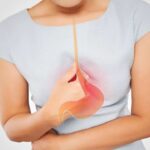Chest pains are commonly caused by muscle strain. However, they can also be the warning signs of many underlying diseases related to the lung, the heart, or any other health condition that needs attention. The degree of pain varies from person to person.
What causes chest pain?
1. Heart inflammation
Myocarditis and pericarditis, both caused by an infection in the body, are two types of inflammation in the heart that lead to various degrees of chest pain. The irritation can be so intense that the symptoms might seem like a heart attack.
2. Pulmonary hypertension
Pulmonary hypertension is the high pressure that disrupts the flow of blood to the heart and the lungs. Specific symptoms include dyspnea (difficulty breathing), dizziness, chest pain, swelling in the ankles or legs, pale lips and skin, fatigue, etc. These symptoms get worse slowly over time and can be life-threatening if left untreated.
3. Stress or anxiety
Some anxiety or extreme stress can trigger panic attacks that might lead to heart attacks. Chest pain during a panic attack happens when you breathe fast, and the muscle stiffness in your chest wall arises. You might experience many accompanying symptoms, such as difficulty breathing, heart palpitations, dizziness, numbness in your hands, tremors, or even fainting.
4. Muscle strain
This condition is one of the most common causes of chest pain. Muscle strain is a common problem of poor posture, heavy lifting, or falling. In most cases, you can use over-the-counter pain relievers to relieve the pain and rest to ease the symptoms.
5. Chest trauma
During an indirect injury or a forceful blow to the chest, other body parts might be hurt, such as the heart of blood vessels, the lungs, the airway, or the liver. Symptom indicates chest pain when coughing, sneezing, laughing, or difficulty breathing with bruises or swellings caused by an injury to muscles, cartilage, or ribs.
6. Gastroesophageal reflux (GERD)
Acid reflux occurs when stomach content flows back up to the throat, causing symptoms such as heartburn, bloating, belching, or abdominal pains that spread up to the throat. After heartburn during a reflux attack, you may also feel chest pain. Heartburn can cause a painful burning sensation in the chest area.
7. Cholecystitis
Cholecystitis is the inflammation of the gallbladder. You might feel severe pain in the upper right abdomen, which then spreads to the organs located on the right side, including the chest. In addition to abdominal pain, patients might experience other symptoms such as nausea, vomiting, fever, sweating, and loss of appetite.
8. Shingles
The disease is caused by the varicella-zoster virus. The nerve damage caused by this viral infection can lead to chest pain. If you notice a rash, pain, tingling or numbness, and fluid-filled blisters that crack and crust over, you may have shingles.
9. Pleurisy
Pleurisy is a condition in which the membranes lining the inside of the chest cavity become inflamed and swollen, causing pain in the chest every time you inhale and exhale. In some cases, pain can occur in the shoulders and back. Chest pain is usually worse when you cough, sneeze, laugh, or breath deeply. You may also have a fever, chills, or difficulty breathing.
10. Pneumonia
The infection will affect your lungs, causing pain on either side of your chest when you cough or breathe.
What test can be done?
If you experience chronic or severe chest pains, you should see a healthcare provider to get tested to help diagnose and eliminate possible heart-related problems as a cause of your pain. Tests may include:
- A Troponin blood test, which measures the level of troponin the heart releases into your bloodstream
- An electrocardiogram ECG, which monitors heart rate or heart rhythm
- Echocardiography, which shows the movement of the blood through the heart chambers and heart valves
- A chest X-ray, which used to provide details on the heart, lungs, and blood vessels.
- A computed tomography (CT) scan or a cardiac magnetic resonance imaging (MRI), which used to find blockages in the heart or aorta.








